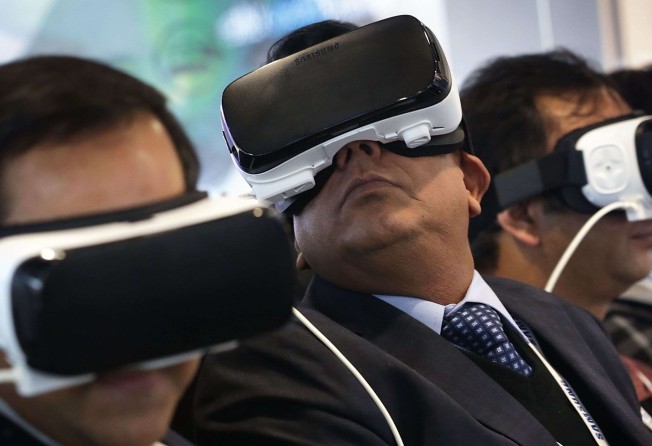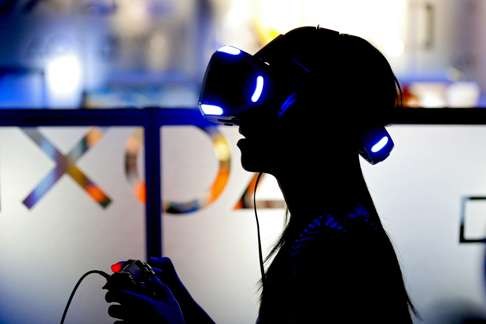
VR poised to become core part of tech industry’s own reality
Last year’s 5.7 billion yuan VR revenue in China predicted to hit 55 billion yuan by 2020

Reality gaming — virtual and augmented — is taking over the Chinese technology sector, say analysts, and with both expected to become a lot more widespread over the next year, companies are rushing to grab a share of what could become a 55 billion yuan domestic industry by 2020.
According to a new BNP Paribas report, led by analyst Laura Chen, virtual reality (VR) — the immersive and interactive simulation of reality — especially is becoming the core activity for many firms, with mobile VR set to dominate the landscape, following on the heels of the blockbuster augmented reality (AR) smartphone game, Pokémon Go.
“We see the potential for China to become one of the most important markets for VR in two to three years,” said Chen.
The enthusiasm for VR products is growing at a furious pace, with iiMedia Research Group now estimating the VR market will surge around 268 per cent in size this year.
In value terms, last year’s 5.7 billion yuan VR industry will mushroom to 55 billion yuan by 2020, it says.
And the BNP Paribas report highlights how smartphone makers, especially, are now looking at the development of VR as the core part of their own reality moving forward.
The shift is being spurred on by the upcoming launches of Google’s “Daydream” mobile VR platform and an Android “Nougat” operating system with a high-performance VR mode.
Daydream will be “the first step in standardisation,” driving more mobile VR products later this year and early next, Chen said in the report.
This puts relevant companies such as chipmaker Taiwan Semiconductor Manufacturing Co (TSMC), camera module maker Sunny Optical, micro-component system supplier AAC Technologies, and VR manufacturer GoerTek in pole positions, analysts say.

For instance, Pokémon Go’s AR requires the latest Samsung Galaxy or iPhones smartphone, as it needs three sensors, significant memory, and higher battery capacity.
Because of the high-tech requirements, however, analysts do not expect a mature market for mobile VR until the second half of 2017 or 2018. They also worry VR may be hurt by slower-than-expected developments in technology, slow adoption of high-tech hardware, and weak shipments.
In China, specifically, regulatory restrictions that have typically dogged tech companies also pose challenges.
Facebook, which launched its VR headset “Occulus Rift” in March, has been unable to sell its products on the mainland, as the company is banned there.
This has also affected Samsung’s “Gear” VR headset, which is based on the Occulus software.
Similarly, Google’s hurdles in China over censorship have limited its promotion of its “Cardboard” and “Glass” VR headsets, and Niantic’s Pokémon Go has been unable to tap into the Chinese market because of the game’s reliance on Google Maps, which is blocked on the mainland.
These restrictions have helped clear the way for local Chinese VR companies, however, according to a Variety magazine article.
“Chinese companies don’t always want to be the followers,” 3glasses VR headset CEO Wang Jie was quoted as saying at a CES Asia conference panel on VR. “We want to be the leaders.”
China has officially recognised the growth of the VR industry, with the China Electronics Standardisation Institute’s mid-April White Paper calling for more research into how to regulate the industry.

But as it stands, Chinese mobile AR/VR development appears to be moving forward, and fast.
Tech manufacturer Lenovo revealed in June that its new smartphone, the PHAB2 Pro, will be the first to have Tango AR, or technology that can detects three-dimensional (3D) depth and motion.
Smartphone makers Asustek and Huawei are also expected to release Tango products, analysts say.
In addition to 3D detection, phones are also increasingly adopting haptic features, such as tactile feedback like vibrations on a keyboard, which play large roles in VR.
Rumours are also swirling that Google and HTC are set to introduce “pressure touch” to their next-generation Nexus phones, following in the footsteps of Apple’s 3D Touch interactions.
Chinese smartphone makers such as Xiaomi, Meizu Oppo, and Vivo have also confirmed they are developing pressure-sensitive touch display handsets this year, according to the International Business Times.
Citi analysts Alicia Yap and Xin Wang said in a report last week that these types of devices will push the expansion of VR games in China.
“The development of smart devices will drive the growth in VR games in the next few years,” they said.
Market intelligence firm Tractica is predicting gaming will make up 84 per cent of global VR content revenue by 2020.
In China, which has had rapid expansion in its mobile gaming, activity increased nearly 80 per cent in the first half of this year compared with 2015, meaning mobile AR/VR games as the natural next step for the industry.
China-based NetEase was the first to announce a VR game for Google’s Daydream, which it showed off at this year’s ChinaJoy gaming exhibition.
The firm has spent tens of millions of yuan so far, but the Citi report highlights it’s just one of many firms investing in AR/VR development across the country.
As virtual reality continues its expansion into people’s smartphones, the features hailed in apps such as Pokémon Go will become a lot more common, making VR a firm bet to become the next global mass-market product.